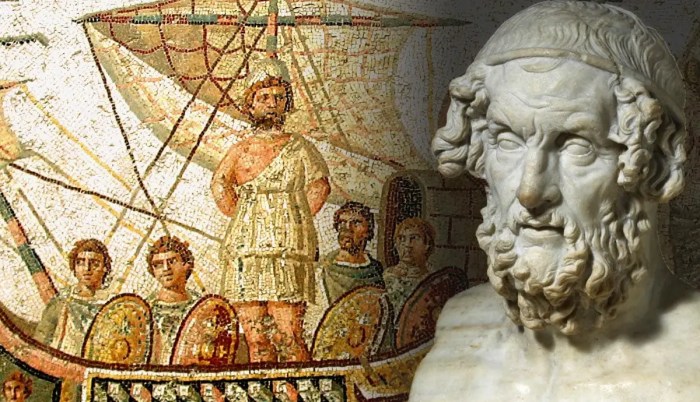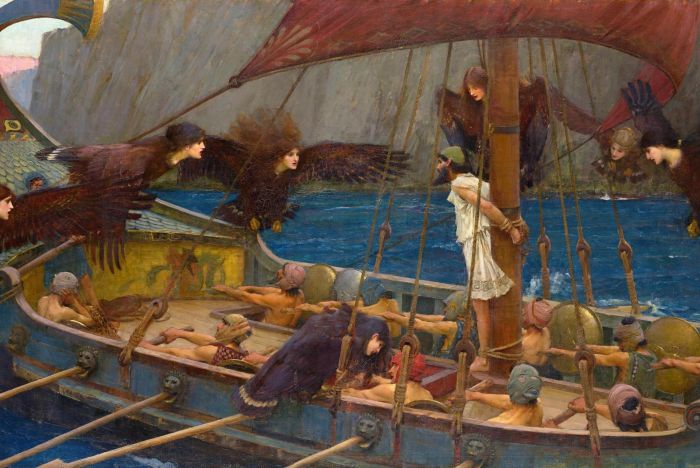The adventures of ulysses summary – The Adventures of Ulysses: An Epic Summary introduces readers to the renowned epic poem, embarking on a captivating journey filled with adventure, heroism, and timeless wisdom. This seminal work, steeped in literary and historical significance, has left an indelible mark on literature and culture, inspiring countless adaptations and retellings throughout the ages.
As we delve into this extraordinary tale, we will encounter Ulysses, the legendary king of Ithaca, and his arduous ten-year odyssey home after the Trojan War. Along the way, we will witness his encounters with mythical creatures, treacherous storms, and the trials and tribulations that test his mettle and shape his destiny.
Introduction to “The Adventures of Ulysses”
The epic poem “The Adventures of Ulysses” holds immense significance in Western literature. Attributed to the ancient Greek poet Homer, this work recounts the extraordinary journey of the titular hero, Ulysses, after the Trojan War. The poem explores timeless themes, providing valuable insights into human nature, heroism, and the human condition.
Ulysses, also known as Odysseus, embarked on a perilous journey home to Ithaca after the fall of Troy. Along the way, he faced countless obstacles, including mythical creatures, natural disasters, and the wrath of the gods. His journey became a symbol of human resilience and the challenges faced in pursuit of one’s destiny.
The literary and historical context of “The Adventures of Ulysses” is rich and complex. The poem draws heavily on Greek mythology, incorporating elements of oral tradition and earlier literary works. It reflects the values, beliefs, and cultural practices of ancient Greece, providing a glimpse into the lives and perspectives of people in that era.
Major Events and Characters

The journey of Ulysses is marked by a series of key events that shape his destiny and test his character.
| Event | Significance | Characters Involved | Outcome |
|---|---|---|---|
| Escape from the Cyclops | Ulysses and his men escape the cave of the one-eyed giant Polyphemus, using cunning and strategy. | Ulysses, Polyphemus | Ulysses blinds Polyphemus and escapes with his crew. |
| Encounters with Circe | Ulysses and his men encounter the sorceress Circe, who transforms his crew into pigs. | Ulysses, Circe | Ulysses resists Circe’s magic and forces her to restore his men. |
| Descent into the Underworld | Ulysses travels to the Underworld to consult the prophet Tiresias about his journey. | Ulysses, Tiresias | Ulysses learns about his future and receives guidance from Tiresias. |
| Return to Ithaca | After years of wandering, Ulysses finally returns to his home island, where he faces challenges from suitors who have taken over his palace. | Ulysses, Penelope, Telemachus | Ulysses defeats the suitors and reclaims his throne. |
These events highlight Ulysses’s courage, determination, and resourcefulness. The characters he encounters along the way represent different aspects of human nature and the challenges faced in life’s journey.
Themes and Symbolism: The Adventures Of Ulysses Summary

The “Adventures of Ulysses” explores several major themes that resonate with readers across time.
Heroism
Ulysses embodies the qualities of a hero, including courage, perseverance, and loyalty. He faces countless obstacles and dangers, but never gives up on his quest to return home.
Loyalty
Ulysses’s journey is marked by the loyalty of his crew and the love of his wife, Penelope. Despite the hardships they face, they remain steadfast in their support for Ulysses.
Fate
The poem explores the role of fate and destiny in human life. Ulysses is guided by prophecies and encounters supernatural forces that shape his journey.
Symbolism is also prevalent in the poem. For example, the Cyclops represents the dangers of hubris, while the sirens represent the temptations that can lead to destruction.
Literary Techniques and Style
Homer employs various literary devices and techniques in “The Adventures of Ulysses.”
Metaphors and Similes
Homer uses vivid metaphors and similes to create vivid imagery and bring the characters and events to life.
Foreshadowing
The poem is rich in foreshadowing, hinting at future events and creating a sense of suspense and anticipation.
Narrative Style
The poem is written in a unique narrative style that combines elements of epic poetry and storytelling. Homer uses a conversational tone and incorporates dialogue to make the characters and events relatable to the audience.
Compared to other epic poems, “The Adventures of Ulysses” stands out for its focus on character development and its exploration of human emotions and experiences.
Historical and Cultural Impact
“The Adventures of Ulysses” has had a profound impact on Western culture and literature.
Historical Influences
The poem draws heavily on Greek mythology and history, reflecting the values and beliefs of ancient Greece.
Literary Impact
The poem has inspired countless works of literature, including Virgil’s “Aeneid” and Dante’s “Inferno.” It has also been adapted into plays, films, and other forms of art.
Cultural Significance
The story of Ulysses has become a cultural touchstone, representing the human struggle against adversity and the search for home.
Contemporary Relevance and Interpretation
“The Adventures of Ulysses” continues to resonate with modern audiences.
Relevance
The themes of heroism, loyalty, and fate remain relevant in today’s world, offering insights into the human condition.
Interpretations, The adventures of ulysses summary
The poem has been interpreted in various ways, with different interpretations focusing on different aspects of the story.
Enduring Appeal
The enduring appeal of “The Adventures of Ulysses” lies in its timeless themes, relatable characters, and captivating narrative. It continues to inspire and entertain readers centuries after its creation.
Key Questions Answered
What is the significance of The Adventures of Ulysses?
The Adventures of Ulysses is a seminal work of Western literature, providing a timeless exploration of heroism, loyalty, and the human condition.
Who is Ulysses?
Ulysses is the legendary king of Ithaca and the protagonist of the epic poem. His ten-year journey home after the Trojan War forms the basis of the story.
What are some of the major themes explored in The Adventures of Ulysses?
The poem explores themes such as heroism, loyalty, fate, and the power of storytelling.